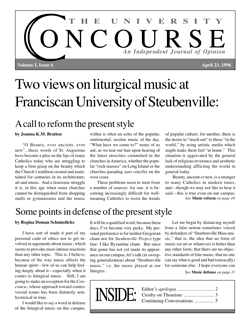Apologia pro disputatione musica
by the editors
Through the feature articles of this issue, the Concourse invites university-wide discussion on the complex and extremely sensitive subject of liturgical music at Franciscan University.
In doing this, we are aware that many in our midst are opposed in principle to exposing such delicate spiritual matters to public scrutiny and debate. There are concerns that, because of the strong feelings involved on all sides, open discussion of these questions would inevitably degenerate into unseemly communal in-fighting, multiplying tensions and devastating innocent people by unfeeling argumentation. So strong, in fact, is the resistance to any public critique of our liturgical music, that last year a scheduled debate on the subject had to be canceled, when one side withdrew for fear it would disunify us exactly at the point where we are most urgently enjoined by our Faith “to be of one heart and mind.”
The editors are not insensible to these legitimate concerns. This is why we took the unprecedented (for the Concourse) step of ensuring that two different points of view—both of them intelligent and moderate in tone—would appear in the same issue. By this means we also hope to avoid giving the impression that we, as editors, are agitating for a particular sort of reform on behalf of a particular party on campus. The truth is we have very diverse views on this question. All of us are agreed, however, that the issue ought to be discussed, and that the Concourse is a good place for it to be done in a right way.
The sacred nature of the subject requires that we approach it with reverence, and take special care to be courteous and charitable in the substance and manner of our address. It does not mean we are forbidden to address it at all. On the contrary, as ecclesiastical history plainly shows, reflection, criticism, discussion and debate are some of the essential human means through which the people of God refine and develop their practice of the Faith—bringing it into more perfect conformity with the truth about God and man. Witness the disputes among early Church leaders (saints included) over the theology of the Incarnation and the wording of the creeds. Or the debates among medieval university faculties on numerous questions touching the Faith. Or the intense wrangling over the liturgy among bishops and theologians at the Second Vatican Council, which issued eventually into radical change—so radical that the Church is still struggling to assimilate it properly
Furthermore, we think the idea that these things cannot be discussed without injury to our communion betrays some unjust assumptions and a basic failure of respect for the persons involved; as if those who presently provide the music lack sufficient Christian maturity to handle even polite and constructive criticism without going to pieces. Or as if those pleading for reform must be driven by a reactionary conservatism, an exaggerated aesthetic sensibility or a general out-of-touchness with “what the Spirit is saying to the churches.”
How do we know, unless we are willing to listen closely to what they have to say, that their views and their suggestions are not inspired by same the Holy Spirit who has directed us thus far?
However convinced we may be that the worship here is inspired by God, pleasing to Him and worthy of Him, as well as good for us, let us beware of complacency—of the too confident assurance that there is no need for us to grow in this area.
And let us have sufficient trust in our localized sensus fidelium to hope that by opening these things to the light of mature Christian discourse, we will arrive eventually at general consensus and a still fuller, more perfect way of worship.
The editors


